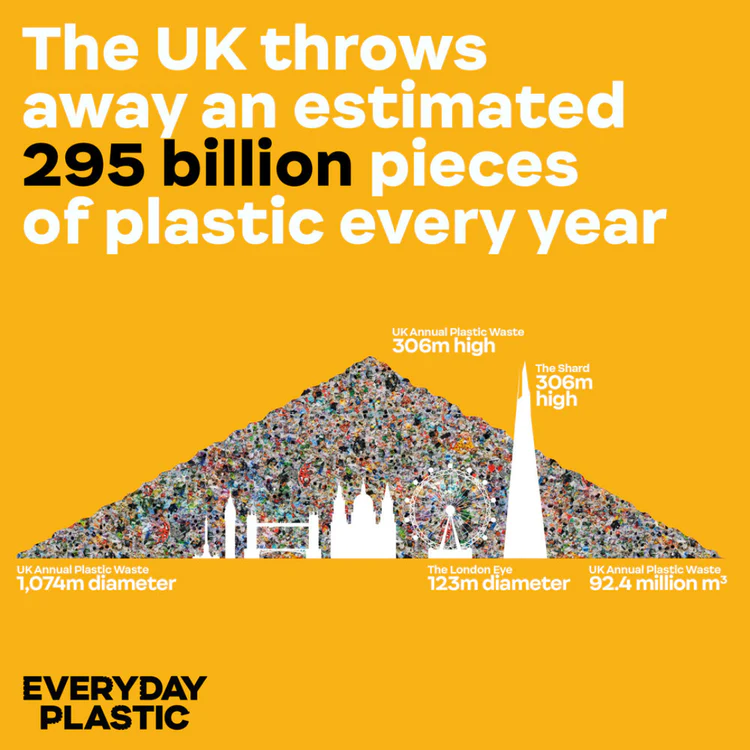Can plastic bags be easily recycled in the UK?

Plastic bags; the poster child for plastic pollution and the scourge of household recycling.
How often have you stood at your bins, plastic bag in hand wondering “Where do I put this?”. It feels wrong to put plastic in the general waste, but you can’t remember if it’s included in your recycling, so you just throw it in and hope for the best. Turns out, there is no right answer. A third of people are putting it in the general waste and it goes to landfill along with all the other items that will still be around in several hundred years, and two thirds of people put it in the recycling bin where it contaminates the rest of the items. Due to the risk of the soft stretchy plastics clogging up the machines designed for handling ridged plastics, none of it gets recycled and will diverted to either incineration or landfill.
This is the conundrum in place that leads only 6% of the UK’s flexible plastic packaging (plastic bags, bread bags, crisp and biscuit wrappers, toilet roll wrapping etc) being recycled. Even though plastic packaging makes up nearly half of the UK’s plastic waste and a large portion of this is soft plastics. A problem not helped by the fact that currently only around 16% of UK councils offer soft plastic recycling facilities so recycling with your council collected waste may not be an option.
So, what should you do with your flexible packaging? The easiest thing to do is to take them back to the place where you most likely got them in the first place, the supermarket. Most supermarkets already accept some types of soft plastics and have pledged to expand on this, aiming for more branches to be able to accept a wider range of plastics for recycling. Ensuring that soft plastics can be collected for recycling on a large scale, without contaminating other types of plastic.
However, the supermarket drop off point isn’t a flawless system
not every branch of every supermarket offers plastic collection, and especially in remote areas or in inner cities, access to recycling facilities can be limited. Check with your local branch whether they have a soft plastic collection system in place or look up local recycling facilities using the website recyclenow.com, an organisation that aims to change the way the public thinks about its waste and how it recycles.

But should this be the problem for the public to solve?
Or should the responsibility fall to the industries creating this plastic waste in the first place?
The UK Plastics Pact from WRAP aims for supermarkets and other retailers to provide widespread collection points for plastic bags and wrapping in advance of kerbside collections. Stating that “There is widespread recognition across industry that citizens cannot be expected to know what types of flexible plastic packaging can be recycled. Therefore, all types should be accepted.”
Working of the belief that a more accessible range of plastic collection points whilst kerbside collection is still unavailable in most councils will lead to a greater intake of recyclables and therefore a more effective recycling system. With fewer plastics making their way to landfill or out into the natural environment. This also gives businesses the chance to showcase their dedication to the environment to their customers, accepting the responsibility for the packaging they send out into the world with each purchase. With more and more drop off points for soft plastics popping up across the country and paving the way for soft plastics to be including in kerbside pick-up recycling, recycling of soft plastics could become as normal as putting your cardboard in your recycling bin.

However, despite how positive this progress in access to recycling facilities may seem, the cycle of plastic consumption and blind hope in recycling must come to an end. Countless studies detail the negative effect plastic has on the planet and on our health, and yet it makes its way into our lives every single day.
The UK alone produces more than 2 million metric tons of plastic packaging waste every year
The UK alone produces more than 2 million metric tons of plastic packaging waste every year, the time has come for both industry and consumer to seek out more conscious choices. As consumers we have the power to demand change from the companies we buy with, to make eco-conscious decisions when purchasing and achieve a more environmentally friendly lifestyle. But the choices are limited, packaging production companies and the businesses that purchase from them have the power to make this change from top.
To invest in and develop packaging choices that no longer contribute to the plastic pollution crisis. Change needs to happen from both sides, a consumer demand for a move away from plastic, and an industry lead revolution in packaging options.
So, can plastic bags be easily recycled in the UK?
The answer varies but is hopefully becoming more of a solid yes. But the real question should be, why are we still so focused on recycling and not on our journey to move away from plastic all together?
Enough is enough, let’s cut out plastic.

Written By
Alice Tomkins

